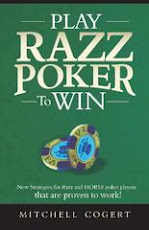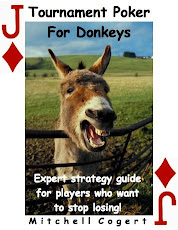
Stop Misplaying Small Pocket Pairs
When you get dealt a small pocket pair in a poker tournament, do you react with fear, confusion, joy or ? I believe small pocket pairs are an opportunity to accumulate a big increase in stack size.
Recently I sat down with a poker player to talk about his game. One of the things he said really surprised me. He stated that he entered a deep stack tournament and in the first round, he folded pocket 4's after a really good player raised pre-flop. His thinking was that he didn't want to get involved with this super aggressive player since if he hit a set, he would probably lose against a better set. In fact, when his opponent revealed pocket Aces, it confirmed his belief his fold was the right decision.
I was quite surprised and by his thinking. It is all wrong.
How To Play Small Pocket Pairs
Pocket pairs, even small pocket pairs, provide an excellent opportunity to stack your opponent when you hit a set. Poker tournaments are about winning. Winning is about accumulating chips. You can't accumulate chips unless you take smart risks with small pairs.
Here are the things to consider when you are dealt a hand like pocket 3's.
1. The stage of the tournament
2. Stack sizes of your opponents and your own stack size
3. Your position and the action in front of you
4. Your table image and the table image of your opponent
5. How your table is being played
Let me give you a couple of examples:
Calling early in an event
I was at the daily event at the Venetian. We had played one round and the table was playing ABC poker. I was taking advantage of this situation by making pre-flop raises after a lot of limpers. I had 12,000, while most opponents had 8-10,000 in chips.
I was in the big blind with pocket 9's. Pocket 9's are not a small pocket pair. They are a premium pair. 6 players limped. There was 750 in the pot, so I raised to 1,200. Everyone folded except for the button. I put this player on a small pair or a suited Ace.
The flop came 9-6-2 with two spades. I bet out. I was raised, so I re-raised. My opponent moved all-in and I called. He had pocket 6's and lost his stack.
The fact is that he played his hand correctly even though he lost. I had 12,000 in chips and he had 10,000. He called my raise because there was no more action pre flop, the stacks were big so the implied odds were excellent, and hitting a set would more than likely double his stack.
While the outcome was not what he wanted, the fact is that he played his hand correctly.
Re-raising in the middle or later rounds of an event
Small pocket pairs are also an opportunity to re-raise pre flop. An example is when an overly aggressive pre flop raiser, raises again in a back position. If you have position and get dealt a small pocket pair consider the re-raise here, if:
- Your opponent has been raising pre flop too frequently
- Your both deep stacked
- You have a tight table image; that is, you haven't been raising pre flop often and almost never three bet pre flop
Overall
Too many players view small pocket pairs as chip bleeders. That is only true if you play them scared. Small pocket pairs are a great opportunity to double up your stack or increase your stack size significantly. In fact, when I am holding a small pocket pair and my opponent raises pre flop I am hoping he has pocket Aces.







